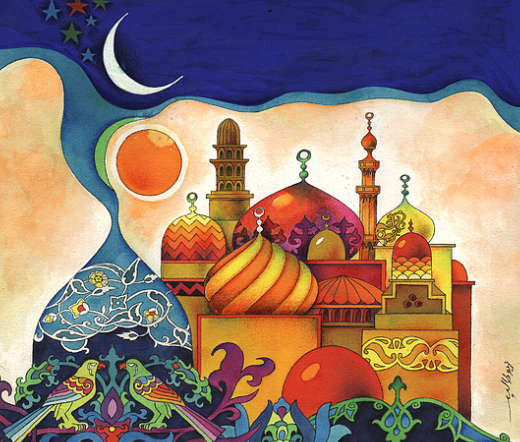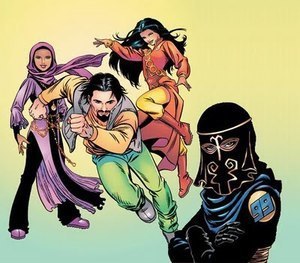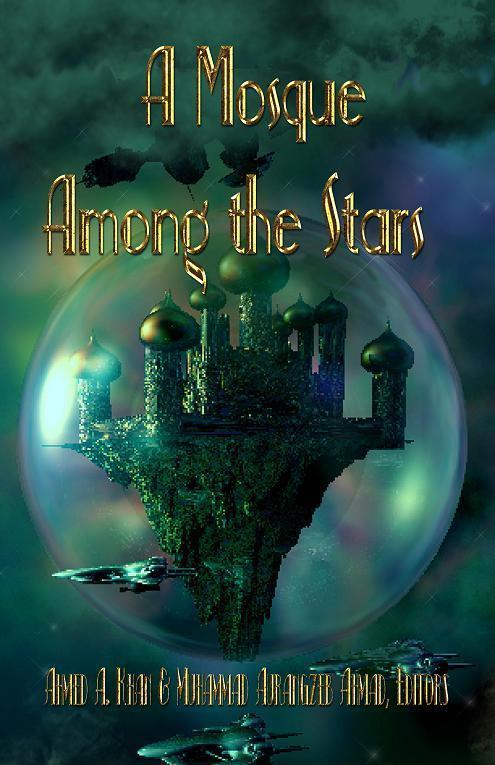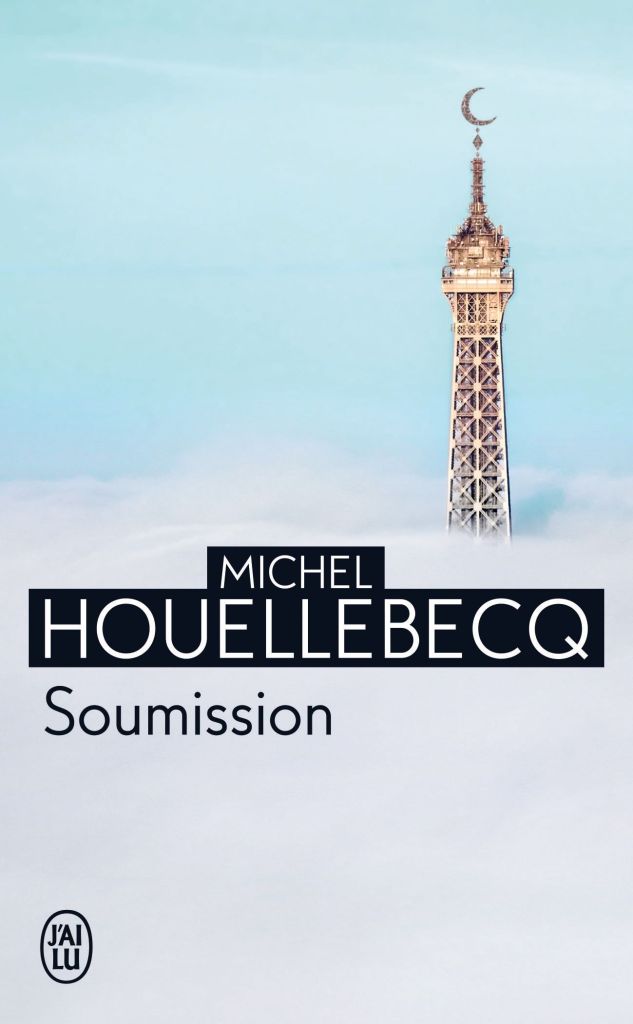|

Islam en science fiction
Islam en science fiction? Hoe? Islam benadrukt het verleden, de tijd van de profeet en van Medina, terwijl SF zich richt op de toekomst, zodus: hoe gaan die twee samen?
Eerst en vooral wil ik SF definiëren zoals ze gedefinieerd staat in The Penguin Dictionary Literary Terms and Literary Theory (het Pinguin Woordenboek van Literaire Termen en Literaire Theorie): een literair genre ‘als een verhaal dat zich afspeelt in een veranderde of alternatieve realiteit’. Dit kan gaan over onderwerpen die verder reiken dan de grenzen van het menselijk normale, maar ook over veranderingen in de vertrouwde menselijke wereld‘. Deze definitie omvat utopieën en dystopieën, het leven op andere planeten, reizen in de tijd, toekomstige oorlogen. Maar wat het verschil maakt met andere literaire genres als fantasy, is de rol van de technologie in het alterneren van de realiteit. Nu, hoe past Islam in deze definitie?
Islam ligt aan de basis van SF. De eerste Arabische proto-SF werd geschreven in de geest van een islamitische utopie. Islamitische/Arabische geleerden in de islamitische Gouden Eeuw (tussen de 6de en de 12de eeuw), tijdens de uitbreiding van het islamitische Rijk, dachten na over religie en wetenschap in hun voorstelling van de ideale islamitische wereld. Als voorbeeld kunnen we de 9de eeuwse al- Madīna al-fāḍila (The Virtuous City) noemen, geschreven door de filosoof en logicus Al- Fārābī (872-950/951 CE). Dit boek beschrijft een ‘perfecte maatschappij’, geregeerd door moslimfilosofen die zijn beïnvloed door Plato’s ‘Republiek’ (gedateerd: 380 voor Chr). In deze virtuele stad is de structuur en de ontwikkeling van het geluk van iedere inwoner het sleutelbegrip. Gelinkt aan deze utopie is Medina, de stad waar de eerste moslimgemeenschap zich rond de profeet Mohammed ontwikkelde.
Dit thema bleef aanwezig tot op het moment dat de eerste moderne Arabische literatuur werd gepubliceerd. Bijvoorbeeld in het boek Rajul taḥt as-Sifr (De man met een temperatuur beneden nul, 1965) van de Egyptische filosoof, journalist en auteur Muṣṭafā Maḥmūd, die beschouwd wordt al de peetvader van de Arabische SF. In dit boek voorspelt een professor de toekomst van Egypte als een wereld gecontroleerd door materialistische interesses en de prognose is: alleen de terugkeer naar God kan de mensen redden.
Reuven Snir beschreef Rajul taḥt as-Sifr als ‘Islamic sci-fi’, een genre dat hij definieert als islamitische promotie via SF. Deze ideeën kunnen bepaalde islamitische opinies en theologische termen bevatten, twee zaken die gezien werden als alternatieven voor nationalisme, liberalisme en ander dominante politieke topics in het discours van de Arabische politieke wereld.
Maar islamitische SF heeft ook andere vormen aangenomen dan utopische verhalen. Strips van Nāyyif al-Muṭṭuwa voor jongvolwassenen, getiteld al-tisʿah wa tisʿūn (The 99) spelen zich af in het alternatieve universum van de 99 superhelden.

Elke held is van een ander deel van de wereld en belichaamt een van Allah’s 99 kenmerken die vernoemd worden in de Qurʾan (Koran), zoals generositeit, wijsheid en kracht.
Islamitische SF beperkt zich niet to de Arabische wereld. De Ethiopische moslim SF schrijver Mäkonnen Endalkaččäw bijvoorbeeld, beeldt ‘realiteit’ uit in zijn verhalen, tegelijk met een angstwekkende en ontzagwekkende inspiratie (cosmic horror, de werken van Allah). De meeste van zijn boeken werden gepubliceerd vorige eeuw in het Amhaars, een Semitische taal in Ethiopië.

Voor de Engelstalige lezers kan de anthologie A Mosque Among the Stars (2008), uitgegeven door Muhammad Aurangzeb Ahmad en Ahmed Khan worden gedownload op de website www.islamscifi.com.
Islamitische SF wordt hoogstwaarschijnlijk niet aanvaard door iedereen. al-Muṭṭuwa bijvoorbeeld wordt een ketterse pion van het westen genoemd. Daarenboven is islam niet alleen distopisch. Islam in Europa wordt bijvoorbeeld uitgebeeld in het Frans door Houllebecq’s dystopische roman Soumission (Onderwerping, 2015, English trans. Submission, 2015).

Science fiction wordt dikwijls omschreven als een genre dat de toekomst zou voorspellen, niet alleen wat betreft technologie, maar ook hoe het mensdom hierdoor zou worden beïnvloed. Dezelfde bemerking zou kunnen gelden voor islamitische SF, die steeds maar meer wordt gedomineerd door technologie: zal het een spirituele toevlucht worden, een hang naar de toekomst, of beide?
Desiree Custers
Vertaling uit het Engels: Nicole Van Overstraeten
Voor meer artikelen van deze auteur: zie blog https://issabramil.wordpress.com/
Islam and science fiction? How? Islam emphasizes the past, such as time of the prophet and Medina while sci-fi focuses on the future, so how do these go together?
So, first off, let me define sci-fi using the definition of The Penguin Dictionary Literary Terms and Literary Theory as a literary genre containing: “a narrative which is set in an alternative or altered reality. This can either contain topics that go beyond the confines of the normal human (…) but also changes to the familiar human world.” This definition includes utopias and dystopias, life on other planets, time travel, future war. But what makes it different from other literary genres such as fantasy, is the role of technological in altering the reality of the narrative. Now how does Islam fit in to this definition?
First of all, Islam lays at the foundation of modern Arabic science fiction. The first Arabic proto-science fiction was written with the idea of an Islamic ‘utopia’ in mind. Islamic/Arabic scholars in the Islamic ‘scientific golden Age’, (between the 6th and the 12th century) under the expansion of the Islamic empire, reflected on religion and science in their imagination of the ideal society. Take for example the 9th century al- Madīna al-fāḍila (“The Virtuous City”) written the philosopher and logician Al- Fārābī (872-950/951 CE). This book describes a ‘perfect society’ ruled by Muslim philosophers influenced by Plato’s Republic (dated around 380 B.C.). In the virtuous city, it is the structure and development of each of the inhabitants’ happiness that is key. Reference to this utopia is Medina, the city in which the first Muslim community of the prophet.
This theme remained when modern Arabic literature was first published. See for example Rajul taḥt as-Sifr (‘The man with a temperature below zero’, 1965) by the Egyptian philosopher, journalist and author Muṣṭafā Maḥmūd who is considered as the “father of Arabic SF”. In it, the main character, a professor, predicts Egypt’s future as one in which the human life controlled by materialistic interests and forecasts that people will only be able to turn to God for redemption.
Reuven Snir has described Rajul taḥt as-Sifr as ‘Islamic sci-fi’, a genre which he defines as promoting Islamic concepts through sci-fi. These concepts can be certain religious views and terms common to Islamic theology, two things that were/are viewed as an alternative to nationalism, liberalism and other dominant political discourses in Arab politics.
(Some of the superheroes from ‘the 99’)
But Islamic sci-fi has also taken on other forms than utopian narratives. Nāyyif al-Muṭṭuwaʿ’s comic series for young adults titled al-tisʿah wa tisʿūn (‘The 99’) takes place in the alternative universe of the 99 superheroes. Each of them is from a different part of the world and embodies one of Allah’s 99 characteristics which are mentioned in the Qurʾan (such as generosity, wisdom and strength) in the series that ran from 2007 until 2014.
Islamic sci-fi is not limited to the Arabic world. The Ethiopian Muslim sci-fi writer Mäkonnen Endalkaččäw, for example, portrays “reality” in his stories as both terrifying (cosmic horror) and awe inspiring (the workings of Allah). Endalkaččäw works were mostly published in the mid of the previous century in the Amharic language. For those reading English, the anthology A Mosque Among the Stars (2008) which is edited by Muhammad Aurangzeb Ahmad and Ahmed Khan can be downloaded on the website www.islamscifi.com.
Cover of A Mosque Among the Stars
Islamic sci-fi has not been positively accepted by everyone. al-Muṭṭuwaʿ has for example been called a heretic and pawn of the West. Furthermore, Islam is not only ‘utopian’. Islam in Europe is for example displayed in French writer Michel Houllebecq’s
dystopian novel Soumission (2015, English trans. Submission, 2015). The novel is set in France in 2022, when the national election is won by a Muslim party (supported by a Socialist Party) which upholds traditionalist and patriarchal values.
(Cover of Soumission)
Sci-fi has often been described as a genre predicting the future, not just what technology will look like, but also how it will affect the human kind. The same claim could be made about sci-fi’s take on Islam in a future that is increasingly dominated by technology: will it become a spiritual resort, a cling to the past, or both?
For more articles written by this author visit her blog at: https://issabramil.wordpress.com/
|




